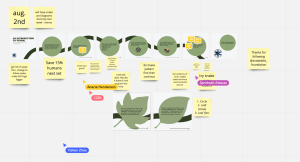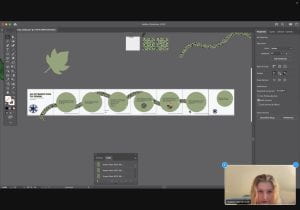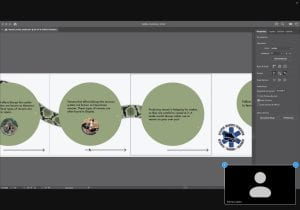When Dr. Kate Jackson first proposed the COIL project as an alternative to our creative capstone for her herpetology class, I was a little unsure of what that project would even be. We were told that it would be working collaboratively with graphic design students from Humber College, to create something that could be used by the Asclepius Snakebite Foundation–an organization that aims to reduce the burden of snakebite in underdeveloped countries. That was our outline, but no one–including all of the students involved–really knew what we would be creating. The first time I hopped onto the miro board, our collaborative hub, I found a lot of half-finished drafts for social media posts, and ideas for things to make. But one concept stood above the rest–a handbook, proposed by one Emma Skinn, on how to survive a snakebite.
My name is Lauren O’Rourke, I’m a rising junior biology major and when COIL ended, neither me nor my companions from both Humber and Whitman were prepared to let go of our work. There was simply far too much left unfinished, left unsaid. And so our supervisor, Dr. Tuhin Giri, arranged for both groups to continue work over the summer. As one of the Whitman students, I acted as a scientific consultant to the design students. I would write text, talk about the scientific conventions, and do research to give my collaborators more information about whatever topic they needed. When I found my way onto the snakebite handbook team, this remained my role. Working with two other students from Humber, the handbook quickly became my main project during coil and over the summer. The hope behind it was that we could provide clear, accurate, and precise instructions on how to approach the emergency situation of being bitten by a venomous snake. When you are bitten by a venomous snake, there’s no guarantee of survival but we wanted to give definitive instructions on how to optimize your chances–especially due to the rampant misinformation about this topic. In turn, by selling the handbook, we would be able to raise funding to build new clinics in Guinea and Congo–where the foundation does most of its work.

What started as a clear idea quickly became a test of accessibility. The information and graphics not only had to be universally understood, but they had to be understood in an emergency. Trying to match plain language with scientific precision is always a challenge, but it becomes even more difficult when you writing for an emergency. Ultimately, to rise to this test, the handbook ended up having six total drafts, each one very different from the last. Even after the completion of the sixth and final draft, there was still more work to do. How it would be printed, distributed, and sold was also a large concern. While the handbook itself would do a little good on its own, its final purpose was to fund clinics, and so we would have to print it, market it, and sell it at a profit. These steps have yet to be completely figured out but my hope is that eventually, even after the end of the internship, I will see this creation out in the world and that I will continue to be involved as these crucial pieces are worked out. In the meantime, other projects from our team have been launched on the Asclepius snakebite foundation’s social media, and will likely continue to be launched throughout the fundraising season. These projects were all trials in their own rights, but I’m so excited to see what comes of them, and to hopefully continue working with Humber and the Asclepius snakebite foundation.
Experiences like Lauren O’Rourke’s are made possible by the Whitman Internship Grant, which provides funding for students to participate in unpaid internships at nonprofit, some for-profit, and government organizations. We are happy to be sharing blog posts from students who were supported by either a summer, fall, spring, or year-long grants at organizations, businesses, and research labs all around the world. To learn how you could secure a Whitman Internship Grant or host a Whitman intern at your organization, contact us at ccec_info@whitman.edu.

